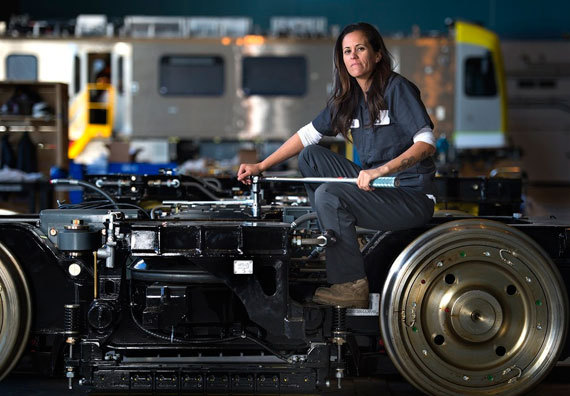California took a major step this year toward closing the lingering wage gap between men and women, as Gov. Jerry Brown signed one of the toughest pay equity laws in the nation.
Women in California who work full time are paid substantially less — a median 84 cents for every dollar — than men, according to a U.S Census Bureau report this year.
“The inequities that have plagued our state and have burdened women forever are slowly being resolved with this kind of bill,” Brown said at a ceremony at Rosie the Riveter National Historical Park in the Bay Area city of Richmond.
The governor called the measure, which will give employees more grounds for challenging perceived discrimination, “a very important milestone.”
It is supported by the California Chamber of Commerce and most state Republican lawmakers. National women’s rights leaders said the legislation was a model for other states and for Congress, where similar efforts have been stalled by Republican opposition.
Businesses said they expected more lawsuits once the new rules take effect Jan. 1.
| The sponsor of the bill was California State Senator Beth Jackson |
Courts have interpreted current law to mean that male and female workers must hold exactly the same jobs to require equal pay, said state Sen. Hannah-Beth Jackson (D-Santa Barbara), author of the legislation.
“Now they're going to have to value the work equally,” she said.
California and the federal government already have laws banning employers from paying women less than men for the same jobs. The new California Fair Pay Act broadens that prohibition by saying bosses cannot pay employees less than those of the opposite sex for “substantially similar work,” even if their titles are different or they work at different sites.
A female housekeeper who cleans hotel rooms, for example, may challenge higher wages paid to a male janitor who cleans the lobby and banquet halls, said Jackson. Similarly, a female grocery clerk could challenge a male clerk's higher wages at a store owned by the same employer but located a few miles away.
The new law also prohibits retaliation against employees who ask about or discuss wages paid to co-workers, and it clarifies their ability to claim retaliation.
On the employer side, those sued by workers would have to show that wage differences are due to factors other than sex, such as merit or seniority; that they are job-related and reasonable; and that they are not due to discrimination.
Workers who believe they have been discriminated against said Tuesday that the new law would help bolster future cases. Employers will now be “accountable to pay women fairly,” said Aileen Rizo, a math consultant for the Fresno County Office of Education who is suing the agency.
Rizo alleges in her federal lawsuit that a male colleague was paid $12,000 more a year for the same work, even though he was hired four years after she was and had less experience, education and seniority.
The new law will mean more employees taking more bosses to court, said J. Al Latham Jr., a labor law attorney and lecturer at the USC Gould School of Law.
“It is going to lead to lots more litigation, which further weakens the business climate in California,” he said.
Geoff DeBoskey, another labor lawyer, agreed, saying it was significant to change from requiring equal pay for equal work to mandating equal pay for substantially similar work, and that would drive some businesses out of California.
Employers will “move operations and grow elsewhere,” said DeBoskey, whose clients include Fortune 500 companies. “If an employer is going to build a new call center, they are just not going to build that in California.”
The new law is the strongest in the country, according to the National Partnership for Women & Families, a Washington-based nonprofit advocacy group for workplace fairness.
Actress Patricia Arquette, whose call for equal pay in her acceptance speech at February’s Academy Awards helped spur Jackson's legislation, hailed the new law as “a critical step toward ensuring that women in California are seen and valued as equals.”
Jennifer Reisch, legal director of the San Francisco group Equal Rights Advocates, said women, especially those of color and mothers, “continue to lose precious income to a pervasive, gender-based wage gap.”
Brown's signature on Jackson's bill “will make California’s equal pay law clearer, stronger and more effective,” she said.
Via Los Angeles Times, Chris Megerian and Patrick McGreevy
http://www.latimes.com/local/political/la-me-pc-gov-brown-equal-pay-bill-20151006-story.html















